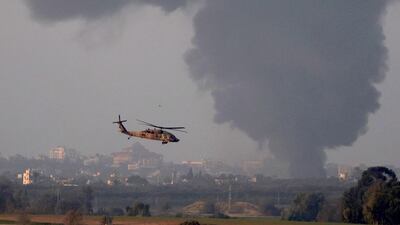Live updates: Follow the latest news on Israel-Gaza
The Bank of Israel has cut interest rates by 0.25 basis points, marking the first reduction since April 2020, as part of efforts to stabilise the markets, support the economy and “reduce uncertainty” amid the Gaza war.
The monetary committee lowered its key rate to 4.5 per cent, from 4.75 per cent, after pausing rates since July.
“The war is having significant economic consequences, both on real economic activity and on the financial markets,” the committee said in a statement.
“There is a great amount of uncertainty with regard to the expected severity and duration of the war, which is, in turn, affecting the extent of the impact on activity.”
The war in Gaza, which began on October 7 after a deadly attack by Hamas, has had dire consequences.
About 22,000 Palestinians have been killed in Gaza, and its gross domestic product is now projected to shrink by 3.7 per cent, from a previous growth forecast of 3.2 per cent, and its economy at a “near-complete standstill”, the World Bank said last month.
Meanwhile, Israel's economy is expected to contract by 5 per cent annually in the fourth quarter of 2023, bringing full-year growth down to 1.5 per cent, S&P Global Ratings said in November.
Growth this year is projected at 0.5 per cent, it said.
The Bank of Israel's Research Department estimates that GDP will grow by 2 per cent each year in 2023 and 2024, and by 5 per cent in 2025.
The revised forecast was built under the assumption that the war’s direct impact on the economy reached its peak in the fourth quarter of 2023, and that the conflict will continue with declining intensity until the end of this year.
“In view of the war, the forecast features an especially high level of uncertainty, including with regard to decisions that the government will need to make regarding how the budget will deal with the defence and civilian needs arising from the war,” the committee said.
The bank's research department expects the government’s budget deficit, estimated at 4 per cent of GDP in 2023, to reach 5.7 per cent of GDP in 2024, and 3.8 per cent of GDP in 2025.
In line with that, the debt-to-GDP ratio is expected to be about 66 per cent at the end of 2024 and at the end of 2025, before declining in the following years towards a ratio of about 63 per cent in 2030.
Meanwhile, the pace of inflation in Israel continues to decline, with the consumer price index falling by 0.3 per cent in November.
Inflation in the past 12 months moderated but remained above the upper bound of the target range, at 3.3 per cent, the regulator said.
Expectations from various sources are that inflation will enter the target range in the first quarter of the year, the committee said.
Annual inflation in 2024 is expected to be 2.4 per cent before falling to 2 per cent in 2025.
However, there are still a number of risks of a potential acceleration in inflation, such as the effects of the war and its progress on economic activity, a depreciation of the shekel, as well as fiscal behaviour, the central bank said.
While the shekel has weakened against most of the world's major currencies since the start of the war, the currency strengthened by 2.7 per cent against the US dollar and by 1.7 per cent against the euro since the previous interest rate decision.
Looking ahead, “the interest rate path will be determined in accordance with the continued convergence of inflation to its target, continued stability in the financial markets, economic activity, and fiscal policy”, the committee said.


















